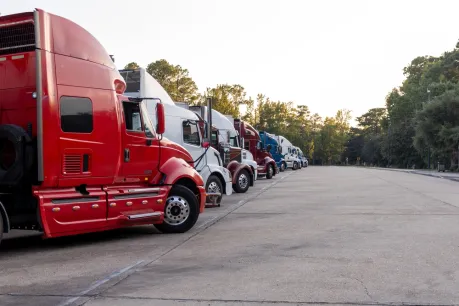Overtime Pay and the Motor Carrier Rule: What Trucking Workers Need to Know

Injured?
You've probably heard about the Motor Carrier Exemption if you’re driving trucks, fixing them, or helping load them for a company that moves goods across state lines. It’s part of the Fair Labor Standards Act (FLSA), and it can impact whether or not you're owed overtime. Here’s a walkthrough of what this exemption means, who it applies to, and where it doesn’t apply.
What Is the Motor Carrier Exemption?
Under Section 13(b)(1) of the Fair Labor Standards Act (FLSA), certain employees are exempt from overtime pay if all of the following apply:
- They work for a motor carrier or a private motor carrier
- Their job directly impacts the safe operation of vehicles weighing more than 10,000 lbs, involved in interstate or foreign commerce
- They do not fall under the small vehicle exception
This exemption exists because the U.S. Department of Transportation (DOT)—not the Department of Labor (DOL)—regulates safety standards and hours of service for specific transportation roles.
Who’s Covered?
The exemption applies to four specific positions:
- Drivers
- Driver’s helpers
- Loaders
- Mechanics
However, it only applies if:
- Your work involves interstate commerce—either crossing state lines or working with goods that are part of interstate shipments
- You regularly or occasionally perform tasks that affect vehicle safety, not just one-off assignments
Once you’ve been assigned a duty that ties into interstate commerce, you’re generally considered exempt from overtime under this rule for up to four months, even if that duty isn’t recurring.
Note: Courts and regulators have sometimes extended this exemption to employees who could reasonably be expected to perform interstate duties, even if they haven’t yet done so. Because this interpretation isn’t in the statute itself, it may be subject to future legal challenges.
Carrier Types Explained
- A motor carrier transports goods or passengers for compensation
- A motor private carrier transports its own property to support its business, for example, a bakery delivering its own bread in company-owned trucks
This distinction doesn’t affect whether the exemption applies; what matters is the type of work being done and whether it meets the criteria.
Where the Exemption Doesn’t Apply
The motor carrier exemption does not cover employees whose jobs don’t directly impact the safety of vehicle operations. That includes:
- Dispatchers
- Office staff
- People who unload trucks
- Loaders without responsibility for securing cargo safely
- Garage or repair shop employees who don’t work directly for the motor carrier
- Vehicle rental or leasing staff who don’t operate the transportation side
The bottom line is that if your job doesn’t affect vehicle safety, you’re probably still owed overtime.
The Small Vehicle Exception Explained
Even if you usually qualify for the motor carrier exemption, the FLSA still requires overtime pay in any workweek where your duties involve small vehicles.
A small vehicle weighs 10,000 pounds or less, unless it meets one of these exceptions:
- Designed to carry more than eight passengers for compensation
- Designed to carry more than 15 passengers, paid or not
- Used to transport hazardous materials requiring placards
If you primarily work with small vehicles—even just for one week—you’re not exempt that week. That means your employer must pay you overtime for any hours worked over 40.
Common Employer Mistakes
Employers often misapply the exemption, leading to wage violations. Common mistakes include:
- Assuming someone is exempt just because they occasionally drive or load
- Treating dispatchers or admin staff as exempt when they shouldn’t be
- Failing to track when employees switch between small and large vehicles
- Overlooking that, working on a company vehicle only counts if that vehicle is used in interstate commerce
To stay compliant, employers must evaluate an employee’s actual day-to-day duties, not just their job title.
Need Help With an Unpaid Overtime Case?
Exempt or not, overtime laws are complex and confusing. And as an employee in the transportation field, you’re already dealing with so many rules from the Department of Transportation. Add that to your employer’s policies, and the whole thing becomes overwhelming.
If you believe your employer hasn’t been paying you overtime as they should, and they’ve failed to address this issue, then you might need someone to step in and fight for you.
That’s where Morgan & Morgan comes in. Tell us about your situation today by filling out this form. We’ll review the case for free.
And if there are legal grounds to take action, our employment attorneys might also be able to represent you for free unless you win.
Disclaimer: This information is based on fact sheets the DOL provides.

We've got your back
Injured?
Not sure what to do next?
We'll guide you through everything you need to know.

